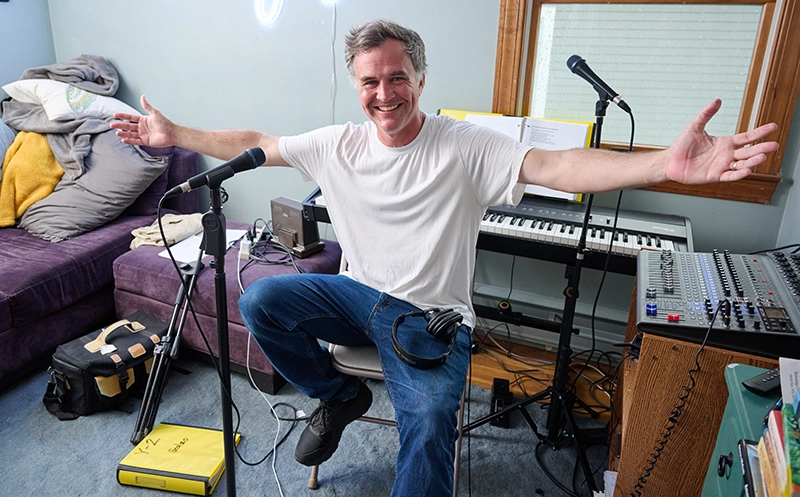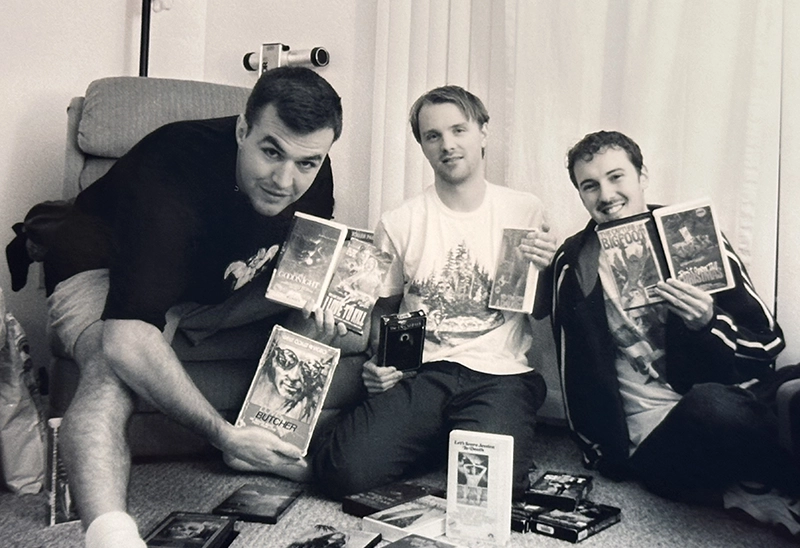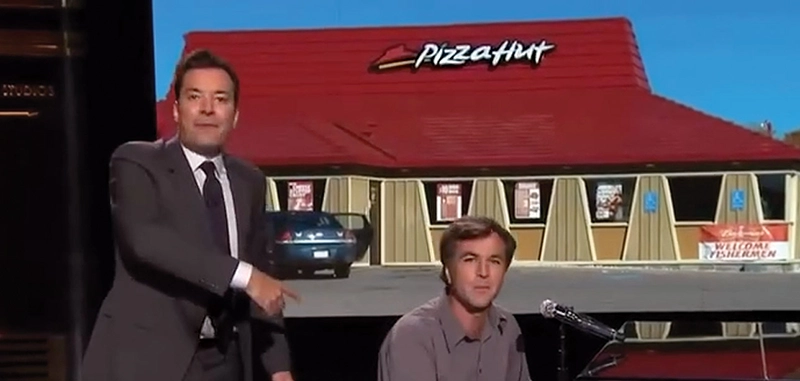Why Matt Farley wrote 25,000 songs for Spotify

Why Matt Farley wrote 25,000 songs for Spotify
By Liz F. Kay
Matt Farley ’00 has been making music for decades. The size of his catalog is extraordinary, with more than 25,000 songs published on Spotify and other platforms.
The tunes might not impress critics. Farley’s more than 70 musical personas include the Hungry Food Band and The Toilet Bowl Cleaners. Some of his popular song titles are “Green Beans,” “The Mothman Song,” and “Best Song About Philadelphia.” He has published hundreds of birthday songs with name, age, and date variations, and prom proposals as well.
Still, it’s hard to scoff at his creative endeavors, which began when he was a student at Providence College with friends Charlie Roxburgh ’99 and Tom Scalzo ’00. The trio continues to record music and make films. In 2016, Farley played one of his songs, “Used to Be a Pizza Hut,” on The Tonight Show with Jimmy Fallon. By 2017, he was earning enough in streaming royalties to quit his day job, and those revenues are now in the six-figure range. The New York Times, The Wall Street Journal, The Guardian, NPR, and Wired have all featured stories about him.
Matt Farley ’00 wrote PC a song
Video by Chris Judge ’05, ’07G with photos from PC Archives and Special Collections
Farley has uploaded hundreds of variations of the same song, changing only a first name. He used Wikipedia to help him create songs about towns in every American state, sorting them by population and starting with the largest.
“It makes more sense to do a city with a million people than a city with 300 people, though when I do songs for the smaller cities, those 300 are really confused,” Farley said. “They’re like ‘Why would anyone do this?’”
The answer: To fulfill the dream of making art full time, a goal Farley achieved in 2017. The year 2023 was his best so far, with $200,000 in revenue.
“Each year has been better than the last, and I see no signs of it stopping,” Farley said. “Every morning I wake up and check the numbers just to be sure.”
Farley made conscious choices throughout his life to be able to continue making music with Scalzo, who has a master’s degree in publishing, and films with Roxburgh, now a visual media coordinator. For example, after graduating from PC with a degree in English, Farley took a job working three days a week in a group home for teens in New Hampshire and stayed there for 17 years. The pay wasn’t great but he had four days free to work on his movies and music.
When digital music distribution services such as CDBaby and Apple iTunes launched, Farley reviewed the catalog of 1,000 songs he and Scalzo had recorded in the years since they had graduated and put out 10 albums’ worth of their best material. Initially, they were a bit embarrassed about the silly songs, so they would include 10 serious songs and a few jokes on each album.
“And of course, the only things that people responded to were the jokes,” Farley said. “If we made $6 in a month that was a huge success.”
As he described on a fan page for his college band, Moes Haven, it dawned on Farley around 2008 that while earning $2 on one song wasn’t much, “earning $2 per song on thousands of songs could be a real income and would also be amusingly ridiculous.”
Essentially Farley had organically stumbled on search engine optimization: creating content that people were looking for. For example, they had a few songs that mentioned celebrities.
“If someone types in ‘Hugh Grant,’ for instance, the only thing they’re going to find is our song about how great Hugh Grant is,” he said. “I thought, ‘Well, I could just write a song about every celebrity.’”
He had a similar realization about food, and after noting the relative popularity of their song “Shut Up Your Monkey,” concluded people must be looking for songs about animals, too.
The debut of streaming services like Spotify in 2008 and their integration into smart home devices such as Amazon’s Echo in 2014 revealed the popularity of silly songs about bodily functions, especially among children. Many of Farley’s songs on those topics have been played millions of times. Every month, more than 150,000 people listen to music by the Toilet Bowl Cleaners, which has 14 albums to date.

Farley’s musical career began in childhood when his parents noticed him picking out melodies on a toy organ in the basement of their home in Peabody, Massachusetts. He took lessons with the music teacher at his elementary school for five years.
“That got me a good base of piano knowledge, and then from that point on, I was just exploring it myself, which was more fun because I could play whatever I wanted,” Farley said.
During his first year at PC, Farley lived in McDermott Hall on the same floor as Roxburgh and Scalzo. They were members of the Honors Program and recognized their similar interests. Scalzo and Farley started recording music and Roxburgh and Farley made films.
“Now, more than 25 years later, we’re still doing it,” Farley said.
By senior year, Farley spent entire weekends in his Bedford Hall apartment playing electronic keyboard with his roommate Scalzo on acoustic guitar, recording songs on a fourtrack cassette recorder.
“With Matt and Charlie, there was always something in the works, some project to focus on. And that made for a college life that was never boring,” Scalzo said.
During one recording marathon, they decided to never say no to a song idea.
“The minute you start judging your own ideas, you get to the point where you just start saying no,” Farley said. “It’s easy to find the potential flaw in an idea. If an idea comes, it’s easier to just do it. You waste less time writing a bad song than you do overthinking.”
That approach has resulted in prolific output. Farley would prefer to write music that’s as good as any respected songwriter, but those aren’t the songs that earn money or attract attention.
“Even if it’s bad, who cares?” Farley said. “I’m a bad judge of my own work. All my favorite compositions are the least popular.”

Farley also honed his promotional skills at PC. Each semester he organized a variety show in Stuart’s, the student pub in Bedford. He plastered campus with fliers with his photo and invited other students to perform, in the hopes that the guests would bring friends. He wrote songs about happenings on campus in the late 1990s, like “Save the Grotto,” about elimination of “Grotto Beach” to make way for St. Dominic Chapel.
Farley and Roxburgh took a similar approach to their films, once reserving a lecture hall in Moore Hall to screen their premiere of The Paperboy.
“I’m a desperate entertainer who just wants an audience,” Farley said.
Both Farley and Roxburgh made films in high school and continued in college.
“What we learned is we had a whole campus of potential actors at our disposal,” Farley said. “We could knock on someone’s door and be like, ‘Hey, do you want to be in a movie?”
Roxburgh worked for Academic Media Services as a student and used editing gear there to turn their camcorder footage into films. After graduation, he earned a master’s degree in graphic design and video production and worked in Hollywood. There, he learned techniques that he applied to their personal projects, which stream on platforms like Vimeo, Amazon Prime, and Tubi.
Roxburgh said that the three motivated each other creatively right from the start. They would get up early and meet at the Admiral Spa diner for breakfast, writing out scenes on notecards, or retreat to adjacent Feinstein classrooms to work independently.
“We knew that we could count on each other to help with any project — no matter how quirky,” Roxburgh said.
In June, Roxburgh awoke at 4:30 a.m. to travel from his Connecticut home to New Hampshire to film scenes for a new production. “We never want to let the other person down,” he said.
Similarly, all of Farley’s recent films feature their relatives, co-workers, or former classmates.
“None of them are trained, and frankly, many of them don’t even want to be in the movie, so that makes for a very unique viewing experience,” Farley said.

The three also travel for screenings and to play shows. In June, a Brooklyn film collective hosted a festival of four of their movies along with a Q&A with Farley and Roxburgh. During the summer, Scalzo, who lives near Binghamton, New York, performed with Farley there and outside Baltimore.
Farley prefers when time with friends coincides with a creative project. As life gets busier with family and other responsibilities, saying you’re going to go hang out with your college friends is a hard sell, he said. However, shooting a movie with your friends is a different proposition.
“You get to do all your socializing, and then you also have a movie to show for it. And I think that’s better than just hanging out,” Farley said.
Scalzo said that these creative projects have gained more importance amid growing family and professional responsibilities.
“Knowing we have an upcoming weekend booked to do some filming, or a live show to practice for, helps to keep our lives balanced and offers a much-needed outlet for creativity,” Scalzo said.
Roxburgh agreed. “They bring joy to my life,” he said.

At home, Farley has a straightforward routine. He and his wife live in Danvers, Massachusetts, and homeschool their two sons. He teaches them during the school year while she works four days a week. From Friday through Sunday, he’s in the spare room of their home with a keyboard and recording equipment, surrounded by artifacts from his journey, like a Tonight Show tote bag and milk bottles from Munroe Dairy in East Providence, where he likes to buy coffee milk — his only vice — when he is in the area.
Farley spends about 20 minutes writing improvised songs and as long as 90 minutes on one with rhyming lyrics. While watching TV on weekday evenings, he’ll do more tedious but necessary tasks, like typing in the title of each uploaded song.
In many songs, Farley includes his cell phone number, a tradition that began in his days writing for The Cowl.
“I would end each of my articles by posting my on-campus phone number, challenging people to call me on the phone, which I thought was funny,” he said.
He always answers. Most callers are college or middle school students who have stumbled on his songs, but once it was a producer for The Tonight Show asking if he wanted to perform his Pizza Hut song on television.
“I honestly forgot that I had written the Pizza Hut song,” Farley said. “As I was talking to her, I was going through my own catalog on Spotify and saw that I had indeed written that song, and that was a relief because I thought she had the wrong songwriter at first.”
Some media coverage dismisses Farley as a spammer merely gaming the streaming system. He dismisses this right back.
“You know, I’m making a living off the music,” Farley said. “It gives me time to write music that I find quite artistically fulfilling.”





